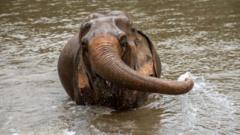Spain's foreign minister, Jose Manuel Albares, confirmed that the Spanish consulate is assisting García’s grieving family. The Koh Yao Elephant Care Centre offers a variety of experiences, charging between 1,900 to 2,900 baht for visitors to feed, shower, and engage with the elephants. Animal rights activists have long criticized such practices, arguing they cause undue stress and discomfort to these creatures, whose complex emotional and social needs cannot be met in captivity.
Reports indicate that a significant portion of elephants used in tourism across Asia endure inadequate living conditions. World Animal Protection, a leading NGO focused on animal welfare, has called for an end to the breeding of elephants for tourism, citing the animals' desire for natural social structures and behaviors. The organization emphasizes that elephants are intelligent beings capable of deep emotions, suffering greatly under poor living conditions.
This incident serves as a painful reminder of the ongoing ethical debates surrounding animal tourism, prompting a reexamination of how elephants and other wildlife are treated in the tourism industry. The conversation about responsible tourism practices is more critical now than ever, as advocates push for better standards for animal welfare globally.
As this story unfolds, it underscores the need for enhanced protections and ethical guidelines for the treatment of animals within tourist attractions.
Reports indicate that a significant portion of elephants used in tourism across Asia endure inadequate living conditions. World Animal Protection, a leading NGO focused on animal welfare, has called for an end to the breeding of elephants for tourism, citing the animals' desire for natural social structures and behaviors. The organization emphasizes that elephants are intelligent beings capable of deep emotions, suffering greatly under poor living conditions.
This incident serves as a painful reminder of the ongoing ethical debates surrounding animal tourism, prompting a reexamination of how elephants and other wildlife are treated in the tourism industry. The conversation about responsible tourism practices is more critical now than ever, as advocates push for better standards for animal welfare globally.
As this story unfolds, it underscores the need for enhanced protections and ethical guidelines for the treatment of animals within tourist attractions.


















